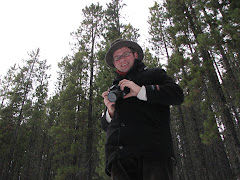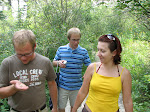Tuesday, April 22, 2008
About Habs Riots...
Quite frankly, I'm not surprised that these unfortunate events have been turned by many into a discrimination against the whole French Community. It's like that every bad behavior of a handful of stupid peasants is a good reason to categorize every single French Canadian as if they were all the same. Too easy. However, it shows clearly to everyone how the Quebec's people are perceived by a majority of English Canadians. This is not, it seems to me, a good motive to even include and associate the hockey team with these stupid rioters' actions. There are stupid people everywhere in this world. But I'm convinced that 96% of Canadians (of any culture) are good people.
When a soccer riot happen in Italy, Russia, or England, are we so quick to say that the whole Italian, Russian, or England people are all idiots and stupid? I don't think so. I wonder if someone can explain to me why every riot in Quebec is taken as a political motive to express hatred against Canadians of French culture? Is this common in the world or a particularity of Canada? Maybe. Furthermore, maybe the image that Canada convey to the world is more shown by the reaction to these riots than by the riots themselves? Following this reasoning, would it be suitable to cut all relations with a nation where stupid sport riots happen? Or put them on an Island and never speak with them again because they are all stupid? I think that all Canadians should reflect on this.
To see the comments, go on: http://ca.sports.yahoo.com/nhl/blog/nhl_experts/post/
Victorious-Montreal-fans-help-city-burn-off-exc?urn=nhl,78297&cp=1#comments
Sunday, March 30, 2008
Waydowntown!
Monday, March 24, 2008
Art and Entertainment
 What is Art? I think real Art is the one done without any materialist motivations. For personal pleasure or to achieve something greater than oneself and which will help people know more about themselves and the universe. For me Art must make people vibrate; When a person gets chickenpox whether listening to a song, watching a movie, or contemplating a painting, Art is really acting. Painting: in our fast paced society, saturated with images of all kind, we never really let our eyes linger or meditate on a work of art more than a few seconds. In this era of visual fast-food consumption, it's easy to become a passive observer who look at images after images without getting really deep in its meaning. Art is something to be watch closely, in detail and in a almost meditative pace if someone wants to become critical and articulate about it. I think that art is a philosophic quest. The intention behind any art work is the most important criterion and define art by itself. What I'm trying to say is that if the main motif of an "artist" is to make money, then his work can't be art. Art must be concerned by a higher ideals. A never-ending quest toward the unknown. Similar to the philosopher who ask questions to the world with his or her writings, artists' songs, poetry, sculptures, paintings, or dances, are big ? put there to make people reflect on the meaning of their lives.
What is Art? I think real Art is the one done without any materialist motivations. For personal pleasure or to achieve something greater than oneself and which will help people know more about themselves and the universe. For me Art must make people vibrate; When a person gets chickenpox whether listening to a song, watching a movie, or contemplating a painting, Art is really acting. Painting: in our fast paced society, saturated with images of all kind, we never really let our eyes linger or meditate on a work of art more than a few seconds. In this era of visual fast-food consumption, it's easy to become a passive observer who look at images after images without getting really deep in its meaning. Art is something to be watch closely, in detail and in a almost meditative pace if someone wants to become critical and articulate about it. I think that art is a philosophic quest. The intention behind any art work is the most important criterion and define art by itself. What I'm trying to say is that if the main motif of an "artist" is to make money, then his work can't be art. Art must be concerned by a higher ideals. A never-ending quest toward the unknown. Similar to the philosopher who ask questions to the world with his or her writings, artists' songs, poetry, sculptures, paintings, or dances, are big ? put there to make people reflect on the meaning of their lives.
Friday, March 14, 2008
Maple Syrup
 Where was I with that story? Ah yes! This juice is collected and boiled for hours and when it has evaporate until the consistence of maple syrup, it is then filtered and put into cans, bottles, etc. The temperature must be perfect; too much cooking and we end up with a thick liquid (like honey) which is not good for maple syrup; Too less and the result is too diluted, too clear, and not adequate. Today, the process of collecting the sap of the maple trees is mechanical; a network of plastic tubes are connected to each tree in the "Erabliere"(a field or forest of maple trees) and a pump draw all the sap into the Cabane a Sucre to be boiled. However, this procedure is not poetic at all. For me it is ugly because we literally suck the juice from the plant, which is more like vampires who suck the blood of their victims. On the contrary, when I was a kid, we used the traditional way to collect the sap which is putting "chaudieres"(recipient) hooked under the hole from where the sap drop by drop fill the recipient. The sap is just flowing when the temperature is above 0 degree Celsius and at night the trees stop dropping their juice. What was I saying... Oh yeah! We used horses and big oak barrels mounted on sleighs to collect the precious sap. And then, when then barrels were filled, we had to head back to the shack and empty them into big reservoirs. And over again until all the sap had been gathered. I have to say that it was a pretty hard labour, for us as well as for 2 the big horses that we had because in Quebec there is, in average , at least 1 meter-deep of snow everywhere in the forest. Even if we used leather snowshoes, our feet still were going deep down in the heavy snow and it was very excriciating for a 8 years old kid. Sometimes we even had to help our horses, because they were stucked in the snow as well. But even if it may sound like nightmare, these souvenirs form the best memories I had from my youth. After a hard day's work, all my brothers, my cousins, uncles, gathered in the cabane a sucre to eat the unbeatable food that our grandmother had cooked: crepes with real maple syrup, real pea soup, ham, cabage salad, potatoes, and tea to help digest this huge amount of food we ate. This was a real fest.
Where was I with that story? Ah yes! This juice is collected and boiled for hours and when it has evaporate until the consistence of maple syrup, it is then filtered and put into cans, bottles, etc. The temperature must be perfect; too much cooking and we end up with a thick liquid (like honey) which is not good for maple syrup; Too less and the result is too diluted, too clear, and not adequate. Today, the process of collecting the sap of the maple trees is mechanical; a network of plastic tubes are connected to each tree in the "Erabliere"(a field or forest of maple trees) and a pump draw all the sap into the Cabane a Sucre to be boiled. However, this procedure is not poetic at all. For me it is ugly because we literally suck the juice from the plant, which is more like vampires who suck the blood of their victims. On the contrary, when I was a kid, we used the traditional way to collect the sap which is putting "chaudieres"(recipient) hooked under the hole from where the sap drop by drop fill the recipient. The sap is just flowing when the temperature is above 0 degree Celsius and at night the trees stop dropping their juice. What was I saying... Oh yeah! We used horses and big oak barrels mounted on sleighs to collect the precious sap. And then, when then barrels were filled, we had to head back to the shack and empty them into big reservoirs. And over again until all the sap had been gathered. I have to say that it was a pretty hard labour, for us as well as for 2 the big horses that we had because in Quebec there is, in average , at least 1 meter-deep of snow everywhere in the forest. Even if we used leather snowshoes, our feet still were going deep down in the heavy snow and it was very excriciating for a 8 years old kid. Sometimes we even had to help our horses, because they were stucked in the snow as well. But even if it may sound like nightmare, these souvenirs form the best memories I had from my youth. After a hard day's work, all my brothers, my cousins, uncles, gathered in the cabane a sucre to eat the unbeatable food that our grandmother had cooked: crepes with real maple syrup, real pea soup, ham, cabage salad, potatoes, and tea to help digest this huge amount of food we ate. This was a real fest.I also remember nights of boiling sap , sitting, chatting and listening to a Montreal Canadiens hockey game diffused on a battery radio. There was no electricity there, just wood and fire to keep us dry and warm. I wish you were there to really see what all this really mean to me but the only way I have is to write that story which just tip of the iceberg of my memory.
20 minutes blog

It's now the season of maple sugar in Quebec, the province where I was born. I'm kind of melancholic when I think about me growing up with that culture, and these adorable memories that I have from it. My granddad on my dad's side had a "cabane a sucre" which is the place where maple syrup is produced, and every spring from 0 to 12 years old I was at the "cabane a sucre" with my brothers, cousins, uncles and aunts, and my grand parents. I'll try to explain a little bit of the history that I know of the maple syrup production, how we harvest the juice from the trees, and how this is, it seems to me, a very rich tradition of the French-Canadian culture. First when our French ancestors came in America, they develop deep relationships with the native tribes who where living in Quebec and the south east part of Ontario. Among these tribes were the "Montagnais" and "Iroquois" and "Hurons" people which revealed the secret that the maple trees were holding to us French foreigners. During the spring (from about March to April) the juice of these trees is going up from the roots to the top of the branches.(which is the same for every kind of tree.) but one particular and unique quality of the maple tree juice or sap is that it is very sweet. Then during the spring, if you make a little incision in the bark of the tree, the sap will come out and we collect it to drink it or to boil it. Our ancestors owe to the native people this amazing discovery. To be continued....
Monday, March 10, 2008
Breakthroughs
Psychological Breakthrough: Dr. Ellen Jane Langer – 1982
In 1982, American Dr. Ellen Jane Langer was credited to have discovered the relation between thinking and having a longer, healthier, and more productive life. In her research, she demonstrated that more mentally active people were having a longer life expectancy. Her motive was to prove the direct relationship between low mental activity and the degeneration of elderly people. In doing so she offered hope to millions of people whose problem were previously seen as irreversible and inevitable such as senility or depression. By her work, numerous articles, and six academic books, she has exposed how the human limits were defined by our own minds. She is the author of Mindfulness and The Power of Mindful Learning. Dr. Langer is the first woman to become tenured in psychology at
.jpg)








